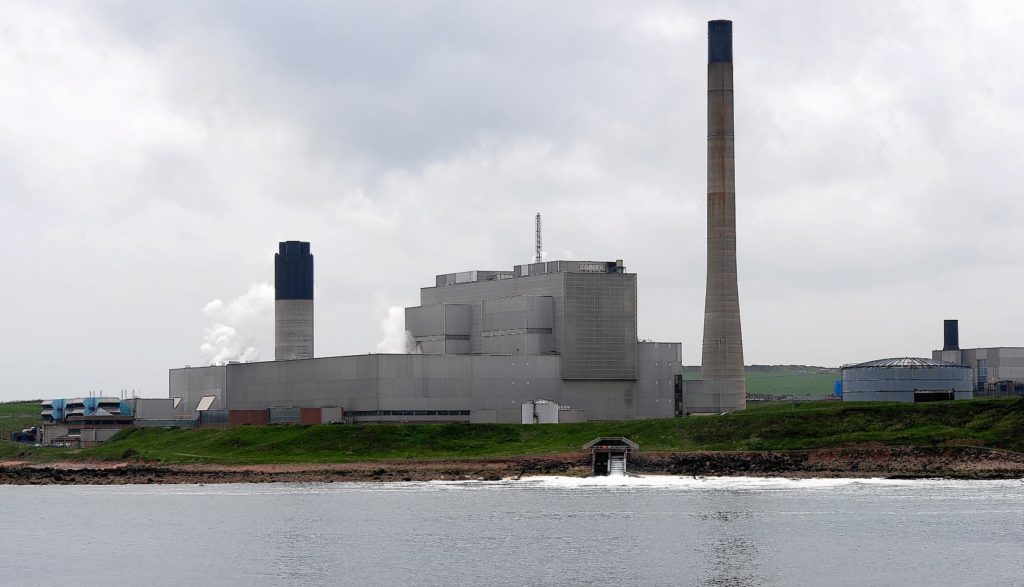
A UK Government taskforce has highlighted Peterhead as a key region to deploy Carbon Capture and Storage (CCS) technology, less than three years after Westminster cut a £1billion fund to develop it.
A project backed by Shell and SSE at Peterhead Power Station was the preferred bidder to fit the new CCS technology when it was cancelled in November of 2015.
However, a new report by the Carbon Capture Utilisation and Storage Task Force (CCUS), has described the region as having “unique potential” for the project due to its links with the oil and gas industry.
At the time funding was withdrawn, industry figures described the move as “devastating” with days of political fallout following the decision.
Now Stewart Stevenson, the SNP MSP for Banffshire and Buchan, has condemned the UK government for wasting time and money by not realising the potential of the region.
He said: “It has taken the UK Government three years to reaffirm what they already knew about the opportunity from CCS.
“In 2015, then Chancellor George Osborne scrapped funding which could have transformed energy in Scotland and beyond and brought hundreds of jobs to Peterhead.
“I am pleased the government has set up a taskforce and is now reconsidering its options but this is a complete waste of money and time given that the benefits were for all to see three years ago.”
CCS is used to capture carbon dioxide from power stations or industry and store it underground in a bid to reduce greenhouse emissions.
The CO2 can then be used for other purposes such as creating building materials.
The new report makes a series of recommendations on where the UK government could deploy the technology in the coming years in order to meet climate change targets.
It describes the St Fergus gas terminal as a natural hub for CO2 with the potential to ship or export it internationally from Peterhead port.
The report authors say Pale Blue Dot’s Acorn CCS project, located at St Fergus, is a “catalyst” for industrial opportunities in the North East, which could be operating in the early 2020s.
St Fergus is a hub for several North Sea installations where around 35% of all natural gas in the UK comes onshore.
They also recommend that the UK government and oil and gas industry identify any North Sea oil and gas infrastructure at risk of being decommissioned within the next decade which could be used for CCS.
The Scottish Government has welcomed the report but said prospects for the sector in Scotland were “badly damaged” by the decision in 2015.
A spokesman said: “CCUS will be important for the long-term, cost-effective decarbonisation of our economy, including in key sectors such as heat and industry, but prospects for the sector in Scotland were badly damaged by the UK Government’s abrupt decision to remove £1 billion of funding from the Peterhead project.
“It is vital that the UK Government act to take on the recommendations in this report, and we will continue to work with the UK Government to progress the deployment of CCUS.
“We are already supporting a number of projects, including the Acorn CCUS Demonstrator Project at St Fergus, and have also supported Scottish Carbon Capture Storage to research and explore opportunities on the ground in Scotland.”
David Duguid, the Conservative MP for Banff and Buchan, defended the UK Government which is now in “a better financial position” to develop CCS.
He said: “Overall UK investment in energy research and technology has doubled since 2015.
“At that time there were technical and financial issues which meant the government didn’t progress the competition.
“We are in a better financial position now.
“Because of work already done at Peterhead and St Fergus, it makes sense to revisit those sites in terms of CCS.
“Such technology will help diversify our sources of power as well as create a new seat of energy excellence in the North East.”
UK Energy Minister Claire Perry said the deployment of the currently “pre-commercial” technology is a “genuine opportunity for the UK to become a global leader” in the field.
The Department for Business, Energy and Industrial Strategy said it will consider the recommendations ahead of setting out its plans for the technology later this year.
Pale Blue Dot, the company behind the Acorn CCS project at St Fergus, welcomed the report.
A spokesman said: “CCS and hydrogen represent massive future employment opportunities for the North East as the oil and gas supply chain seeks out new areas of opportunity. As countries around the worldlook to decarbonise, the North East supply chain can deliver its energy services to support hydrogen and CCS.”
Energy giant Shell, which was behind the original Peterhead CCS plans, said the report shows the importance of the technology.
A spokeswoman for the firm said: “Shell welcomes the publication of the report by the CCUS cost-challenge taskforce.
“It highlights the importance of CCUS in supporting cost-effective decarbonisation across a wide range of sectors in the UK and the urgency of government and industry taking collaborative action now to deliver CCUS at scale and at lowest cost.”

